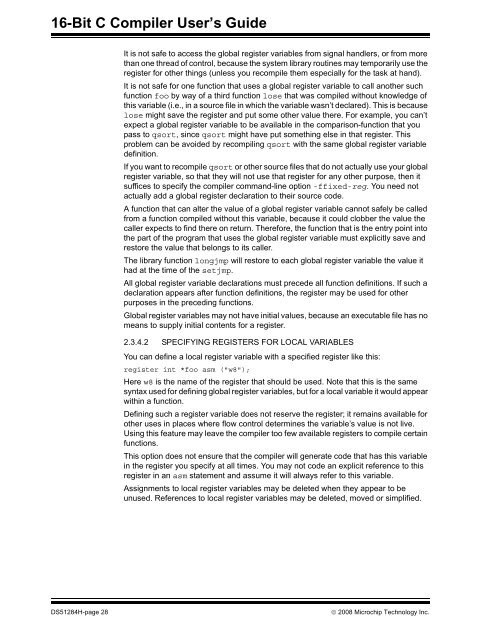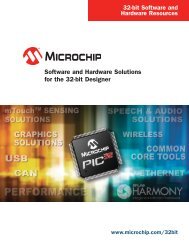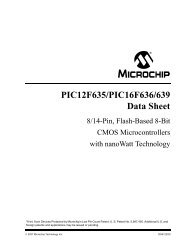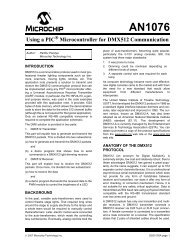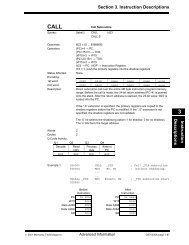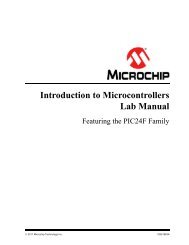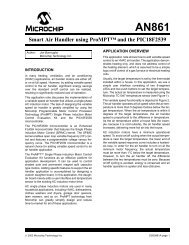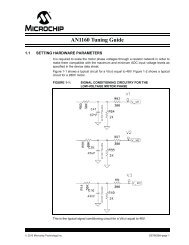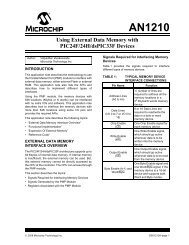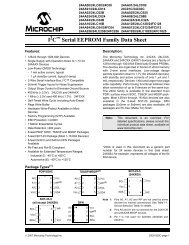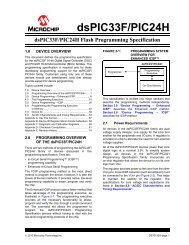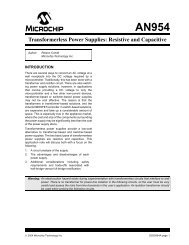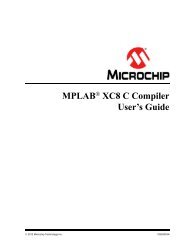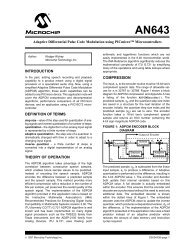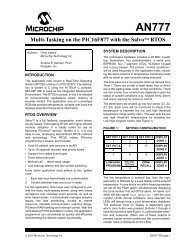MPLAB C Compiler for PIC24 MCUs and dsPIC DSCs ... - Microchip
MPLAB C Compiler for PIC24 MCUs and dsPIC DSCs ... - Microchip
MPLAB C Compiler for PIC24 MCUs and dsPIC DSCs ... - Microchip
Create successful ePaper yourself
Turn your PDF publications into a flip-book with our unique Google optimized e-Paper software.
16-Bit C <strong>Compiler</strong> User’s Guide<br />
It is not safe to access the global register variables from signal h<strong>and</strong>lers, or from more<br />
than one thread of control, because the system library routines may temporarily use the<br />
register <strong>for</strong> other things (unless you recompile them especially <strong>for</strong> the task at h<strong>and</strong>).<br />
It is not safe <strong>for</strong> one function that uses a global register variable to call another such<br />
function foo by way of a third function lose that was compiled without knowledge of<br />
this variable (i.e., in a source file in which the variable wasn’t declared). This is because<br />
lose might save the register <strong>and</strong> put some other value there. For example, you can’t<br />
expect a global register variable to be available in the comparison-function that you<br />
pass to qsort, since qsort might have put something else in that register. This<br />
problem can be avoided by recompiling qsort with the same global register variable<br />
definition.<br />
If you want to recompile qsort or other source files that do not actually use your global<br />
register variable, so that they will not use that register <strong>for</strong> any other purpose, then it<br />
suffices to specify the compiler comm<strong>and</strong>-line option -ffixed-reg. You need not<br />
actually add a global register declaration to their source code.<br />
A function that can alter the value of a global register variable cannot safely be called<br />
from a function compiled without this variable, because it could clobber the value the<br />
caller expects to find there on return. There<strong>for</strong>e, the function that is the entry point into<br />
the part of the program that uses the global register variable must explicitly save <strong>and</strong><br />
restore the value that belongs to its caller.<br />
The library function longjmp will restore to each global register variable the value it<br />
had at the time of the setjmp.<br />
All global register variable declarations must precede all function definitions. If such a<br />
declaration appears after function definitions, the register may be used <strong>for</strong> other<br />
purposes in the preceding functions.<br />
Global register variables may not have initial values, because an executable file has no<br />
means to supply initial contents <strong>for</strong> a register.<br />
2.3.4.2 SPECIFYING REGISTERS FOR LOCAL VARIABLES<br />
You can define a local register variable with a specified register like this:<br />
register int *foo asm ("w8");<br />
Here w8 is the name of the register that should be used. Note that this is the same<br />
syntax used <strong>for</strong> defining global register variables, but <strong>for</strong> a local variable it would appear<br />
within a function.<br />
Defining such a register variable does not reserve the register; it remains available <strong>for</strong><br />
other uses in places where flow control determines the variable’s value is not live.<br />
Using this feature may leave the compiler too few available registers to compile certain<br />
functions.<br />
This option does not ensure that the compiler will generate code that has this variable<br />
in the register you specify at all times. You may not code an explicit reference to this<br />
register in an asm statement <strong>and</strong> assume it will always refer to this variable.<br />
Assignments to local register variables may be deleted when they appear to be<br />
unused. References to local register variables may be deleted, moved or simplified.<br />
DS51284H-page 28 © 2008 <strong>Microchip</strong> Technology Inc.


